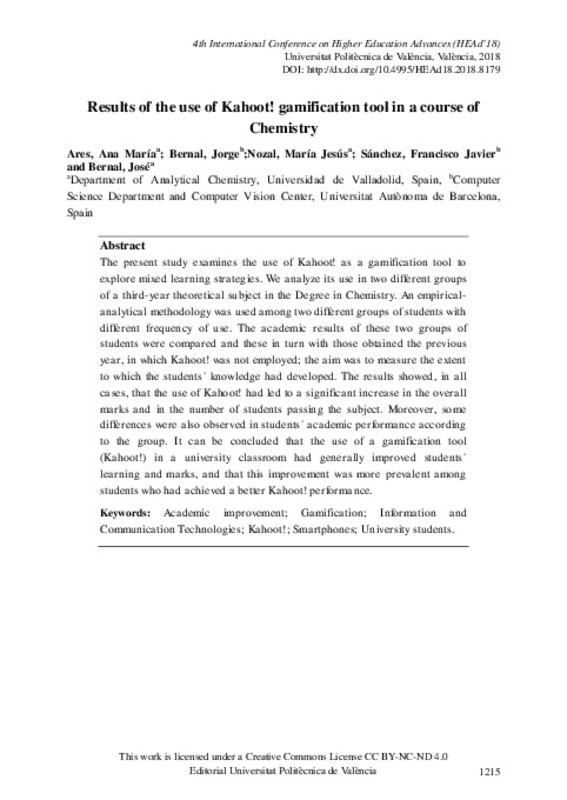JavaScript is disabled for your browser. Some features of this site may not work without it.
Buscar en RiuNet
Listar
Mi cuenta
Estadísticas
Ayuda RiuNet
Admin. UPV
Results of the use of Kahoot! gamification tool in a course of Chemistry
Mostrar el registro sencillo del ítem
Ficheros en el ítem
| dc.contributor.author | Ares, Ana María
|
es_ES |
| dc.contributor.author | Bernal, Jorge
|
es_ES |
| dc.contributor.author | Nozal, María Jesús
|
es_ES |
| dc.contributor.author | Sánchez, Francisco Javier
|
es_ES |
| dc.contributor.author | Bernal, José
|
es_ES |
| dc.date.accessioned | 2018-10-05T13:10:58Z | |
| dc.date.available | 2018-10-05T13:10:58Z | |
| dc.date.issued | 2018-07-02T13:10:58Z | |
| dc.identifier.isbn | 9788490486900 | es_ES |
| dc.identifier.issn | 2603-5871 | |
| dc.identifier.uri | http://hdl.handle.net/10251/109665 | |
| dc.description.abstract | [EN] The present study examines the use of Kahoot! as a gamification tool to explore mixed learning strategies. We analyze its use in two different groups of a theoretical subject of the third course of the Degree in Chemistry. An empirical-analytical methodology was used using Kahoot! in two different groups of students, with different frequencies. The academic results of these two group of students were compared between them and with those obtained in the previous course, in which Kahoot! was not employed, with the aim of measuring the evolution in the students´ knowledge. The results showed, in all cases, that the use of Kahoot! has led to a significant increase in the overall marks, and in the number of students who passed the subject. Moreover, some differences were also observed in students´ academic performance according to the group. Finally, it can be concluded that the use of a gamification tool (Kahoot!) in a university classroom had generally improved students´ learning and marks, and that this improvement is more prevalent in those students who have achieved a better Kahoot! performance. | es_ES |
| dc.description.sponsorship | Authors gratefully acknowledge funding (Universidad de Valladolid, Área de Formación e Innovación Docente; Project Nº12). The authors wish also to thank David Rixham (White Rose English School, Valladolid, Spain) for performing the English revision. | |
| dc.description.uri | http://ocs.editorial.upv.es/index.php/HEAD/HEAD18 | es_ES |
| dc.format.extent | 8 | |
| dc.language | Inglés | es_ES |
| dc.publisher | Editorial Universitat Politècnica de València | es_ES |
| dc.relation.ispartof | 4th International Conference on Higher Education Advances (HEAD'18) | |
| dc.rights | Reconocimiento - No comercial - Sin obra derivada (by-nc-nd) | es_ES |
| dc.subject | Higher Education | es_ES |
| dc.subject | Learning | es_ES |
| dc.subject | Educational systems | es_ES |
| dc.subject | Teaching | es_ES |
| dc.subject | Academic improvement | |
| dc.subject | Gamification | |
| dc.subject | Information and Communication Technologies | |
| dc.subject | Kahoot! | |
| dc.subject | Smartphones | |
| dc.subject | University students | |
| dc.title | Results of the use of Kahoot! gamification tool in a course of Chemistry | es_ES |
| dc.type | Comunicación en congreso | es_ES |
| dc.type | Capítulo de libro | es_ES |
| dc.identifier.doi | 10.4995/HEAD18.2018.8179 | es_ES |
| dc.rights.accessRights | Abierto | es_ES |
| dc.description.bibliographicCitation | Ares, AM.; Bernal, J.; Nozal, MJ.; Sánchez, FJ.; Bernal, J. (2018). Results of the use of Kahoot! gamification tool in a course of Chemistry. Editorial Universitat Politècnica de València. 1215-1222. https://doi.org/10.4995/HEAD18.2018.8179 | es_ES |
| dc.description.accrualMethod | OCS | es_ES |
| dc.relation.conferencename | Fourth International Conference on Higher Education Advances | es_ES |
| dc.relation.conferencedate | Junio 20-22,2018 | es_ES |
| dc.relation.conferenceplace | Valencia, Spain | es_ES |
| dc.relation.publisherversion | http://ocs.editorial.upv.es/index.php/HEAD/HEAD18/paper/view/8179 | es_ES |
| dc.description.upvformatpinicio | 1215 | |
| dc.description.upvformatpfin | 1222 | |
| dc.type.version | info:eu-repo/semantics/publishedVersion | es_ES |
| dc.relation.pasarela | OCS\8179 | es_ES |
| dc.contributor.funder | Universidad de Valladolid |








